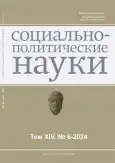Институциональный подход в исследовании политических рисков
- Авторы: Панеш К.М.1
-
Учреждения:
- Государственная Дума Федерального Собрания Российской Федерации
- Выпуск: Том 14, № 6 (2024)
- Страницы: 46-51
- Раздел: Политические институты, процессы и технологии
- URL: https://bakhtiniada.ru/2223-0092/article/view/284288
- DOI: https://doi.org/10.33693/2223-0092-2024-14-6-46-51
- EDN: https://elibrary.ru/CXTWZC
- ID: 284288
Цитировать
Аннотация
Предметом рассмотрения в настоящей статье является институциональный подход в исследовании политических рисков и его обоснование в контексте развития государственных институтов. Отмечается, что момент восприимчивости общества к рискам порождается внутри общества, таким образом являясь непосредственным результатом социальной практики. Выделены факторы, которые определяют диапазон возможностей политической власти по осуществлению регулятивной деятельности. Автором обосновывается связь между обществом и институтами государственного управления. Интеграция управленческих функций основных государственных институтов связана с обеспечением эффективности управления в условиях, когда факторы политического риска входят в область ответственности различных ведомств, либо речь идет о системных рисках, связанных с рассогласованием различных подсистем общества. На уровне действующих социально-политических институтов интеграция органов власти для противостояния значимым факторам риска реализуется в рамках создания специальных функциональных институтов – координационных центров, включающих в себя представителей органов власти, объединение усилий которых необходимо для урегулирования возникшей острой проблемы. Делается вывод о необходимости создания благоприятных условий для организации «горизонтального» взаимодействия различных органов власти и вне структуры координационных центров, которые не могут быть организованы для каждой конкретной проблемы.
Ключевые слова
Полный текст
Открыть статью на сайте журналаОб авторах
Каплан Мугдинович Панеш
Государственная Дума Федерального Собрания Российской Федерации
Автор, ответственный за переписку.
Email: panesh_kaplan@mail.ru
SPIN-код: 7735-6661
кандидат экономических наук, депутат
Россия, г. МоскваСписок литературы
- Алклычев А.М. Ценообразование в период перехода к рыночной экономике. М.: Ин-т экономики, 1995. 145 с.
- Богданов А.А. Тектология. Всеобщая организационная наука. М.: Экономика, 1989.
- Булавина М.А., Новосельский С.О. Перспективы военной безопасности России в существующей геополитической конъюнктуре // Межгосударственное противоборство в условиях глобализации и его влияние на управление национальной обороной Российской Федерации. М., 2023. С. 105–112.
- Гаськов Д.В. Разделение властей и институты власти // Вестник науки и образования. 2019. № 11-3 (65). С. 60–62.
- Гофман А.Б. Солидарность или правила, Дюркгейм или Хайек? о двух формах социальной интеграции // Социальная солидарность и альтруизм: Социологическая традиция и современные междисциплинарные исследования: сб. науч. тр. / отв. ред. Д.В. Ефременко. М., 2014. С. 16. (Серия «Теория и история социологии»)
- Дондоков Ц.С., Кужиков Д.А. Понятие принципа разделения властей: историко-правовой аспект // Вестник ЗабГУ. 2014. № 7. С. 148–154.
- Дюркгейм Э. Самоубийство. Социологический этюд. СПб., 1912.
- Калиненко Н.Л. Импортозамещение и технологический суверенитет // Образование и право. 2023. № 11. С. 87–91.
- Максимович А.В. Методология прогнозирования и стратегии управления социальными рисками // Государственное и муниципальное управление. Ученые записки. 2023. № 4. С. 223–229.
- Новосельский С.О., Моисеева О.А., Филиппова О.А. Коммуникационная политика органов исполнительной власти с населением в социальных сетях // Вопросы политологии. 2023. Т. 13. № 3 (91). С. 1001–1013.
- Тхабисимова Л.А. Оптимизация системы государственной власти: принцип разделения властей // Юристъ-Правоведъ. 2007. № 1 (20). С. 53–56.
- Шиняева О.В., Каюмова Л.Х. Диалог власти и населения в контексте формирования гражданского общества // Известия вузов. Поволжский регион. Общественные науки. 2014. № 1 (29). С. 80–90.
Дополнительные файлы








